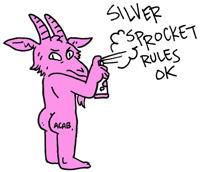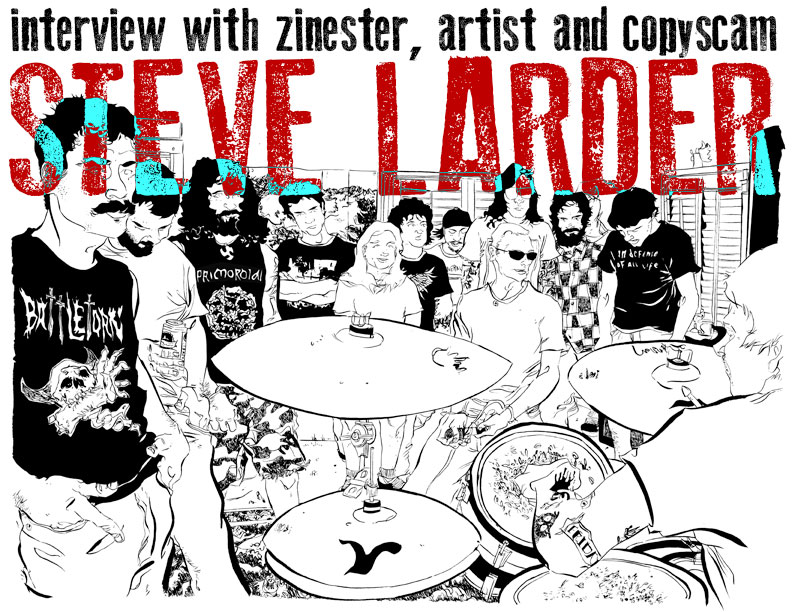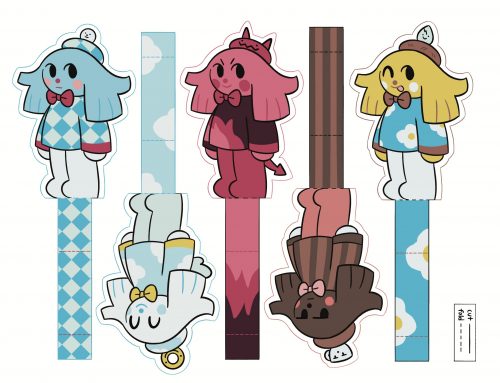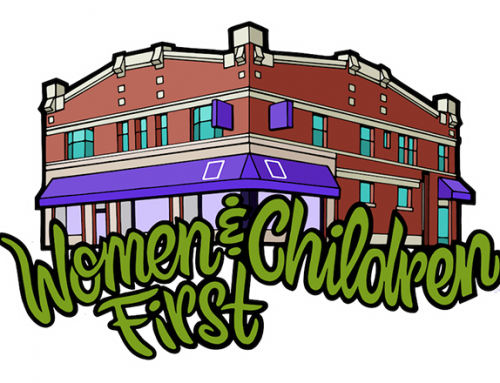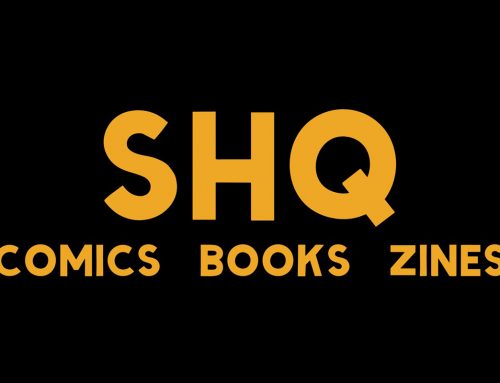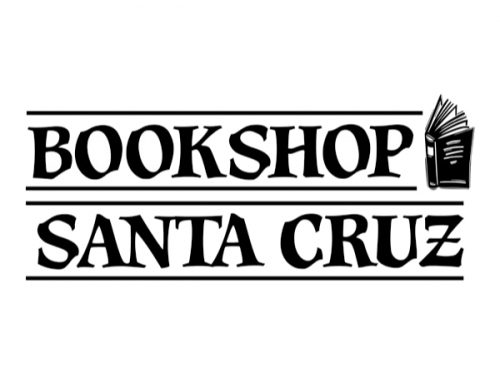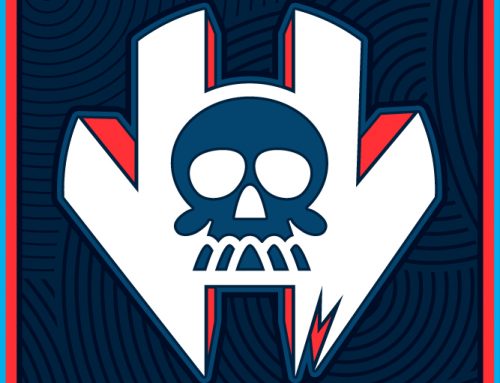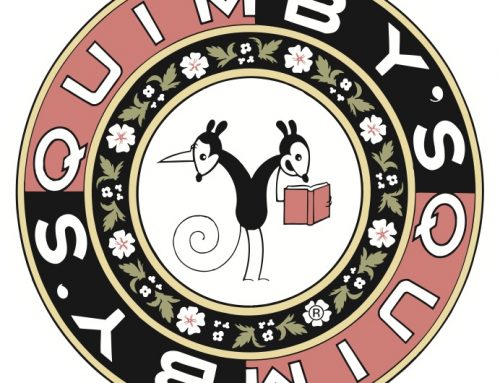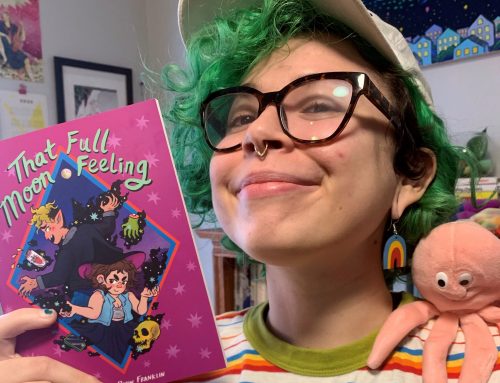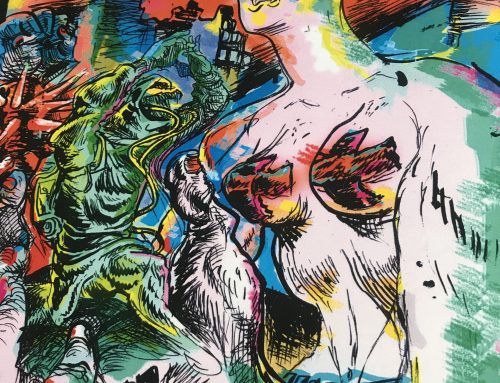Steve Larder has been with As You Were since the very first issue, when his artwork appeared on the cover. Since then, we’ve come to love and expect his intricate, and dare we say beautiful, illustration work. In addition to his comic contributions, he also creates his own zine, Rum Lad.
We were able to steal some of his time and get the scoop on his relationship to Dropdead, Calvin and Hobbes, and his city of Nottingham. Keep reading to find out more.
Interview by Natalye for Silver Sprocket
How does someone like you end up being a contributor to As You Were?
Like many other contributors to As You Were, I received an email out of the blue from Mitch Clem. I’ve always been an avid follower and fan of Mitch’s artwork and comics, so to be asked to draw the cover of the first issue was a real honor. Not only that, but I got to share pages with a bunch of other punk artists I admired in the first place, as well discover some whose work was completely new to me. I’m kinda proud to be a part of it.
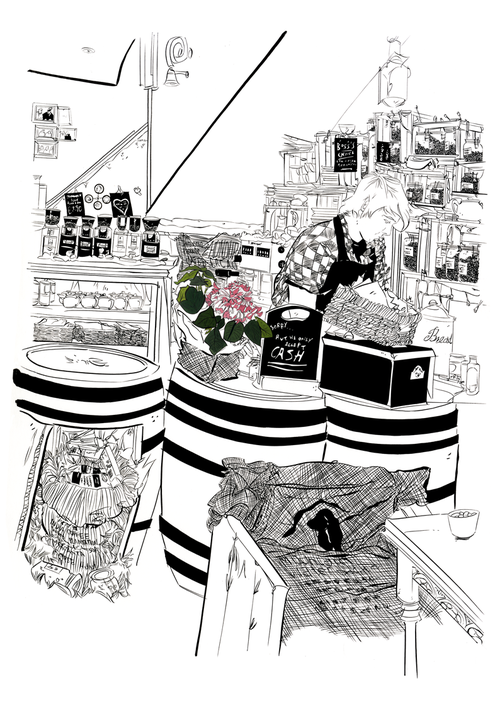
Can you give us some insight on your artistic process? What inspires you? How do you decide on B/W or color? Is there anyone you’d attribute your artistic development to? How did you get into making art in the first place?
I think a lot of artists have a similar story of not really remembering a specific moment when they decided that’s what they wanted to do; they just always have. I was lucky to have an encouraging family who noticed I was big into drawing. For instance, my grandmother would tear up cereal boxes for the blank inside cardboard in an effort to find me something else to doodle on when I ran out of paper.
I enjoyed art at school, then progressed into college doing Art & Design. However, I found it hard to develop anything I was particularly proud of due to the vagueness of what was expected of me. I know that some people can find that kind of freedom liberating, but it had the opposite effect on me. I found it incredibly daunting. I shared a class with someone who, for their first project, covered themselves entirely in paint to writhe naked on a canvas, as well as another person who collected their own hair, urine, and stool samples to display as a final piece of work. I just wanted to draw stuff, y’know?
Eventually I discovered that “illustration” was a thing and took a course at Uni. It seemed to be a much more focused and comfortable approach to apply my work to. Around the same time, I was being introduced to the world of comics by people like Jhonen Vasquez, which was a total lightbulb moment for me, as my previous experience of comics was an extremely limited view of Marvel superheroes and the like. While I totally recognize the influence and importance of that side of comic culture, it’s never been a genre I’ve been particularly keen on. Indie comics seemed relatable to the environment and attitude found in local DIY gigs, which is where I was exposed to zines as well. Punk gave me the confidence boost to say “I can do that.”
When I started drawing zines and flyers, I generally stuck to black and white because it was just easiest to photocopy. Since then, it’s been a method I’ve stuck with out of habit. I occasionally play around with color if I want to highlight certain areas of a drawing or whatever, but I’ll be the first to admit it’s not one of my strengths. Occasionally an illustration job demands it, which is good for me to get out of my comfort zone, but it’s often a trial to settle on something I like. I keep the artistic process as tangible as possible where I can, but it can make things a little arduous when things go wrong. There’s no undo button when I mess something up at the last minute.
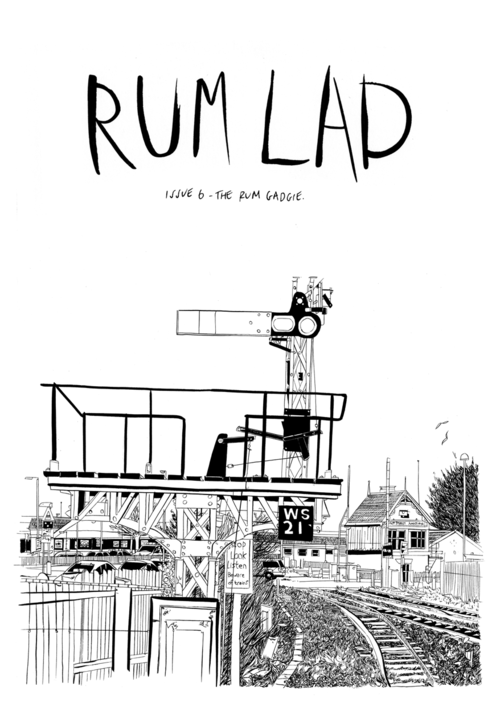
You have an autobiographical zine, Rum Lad. Is this your first zine or did you make others before? What inspired you to create it? How do you decide what kind of stuff makes the cut, versus things that don’t?
Rum Lad was the first I made myself. The first issue was released in 2006 as a split with my then-girlfriend’s zine, “Scared of Bees.” Prior to that, I’d drawn a few covers for my mate Marv’s zine, “Gadgie,” and occasionally wrote some naïve and straight-up terrible “columns” for a local webzine, which I hope have disappeared into the ether. Rum Lad was the first attempt at my own zine, but it took a couple of issues before I developed any sort of structure. I was inspired to contribute something back into a scene I’d gotten so much out of socially and even ethically, really. I also liked the idea of being an active part of a supportive, global network of people who made stuff just because they could.
Rum Lad has almost turned any experience I have into potential source material to draw and write about. I think I do much better at documenting things like touring in a band or generally meandering about than coming up with something fictional. It’s almost an incentive in the first place to do things I normally wouldn’t have the confidence or capacity to achieve on my own. I guess making a zine has been a handy prop in a few situations, too. I’ve had conversations and made friends that sparked through an exchange that usually started with “Oh hey, wanna trade?”
I’m often not as candid as I could be; there [have] definitely been one or two moments where I’ve omitted a couple of details where I don’t want to land anyone in hot water, or whatever. Also, I think to some extent I don’t have the courage to be too “raw,” and I try to have a critical eye on whatever I draw or write about. I’ve had a few occasions where I spent ages on a single paragraph or drawing to then eventually think, “Nah, nobody cares about that.”
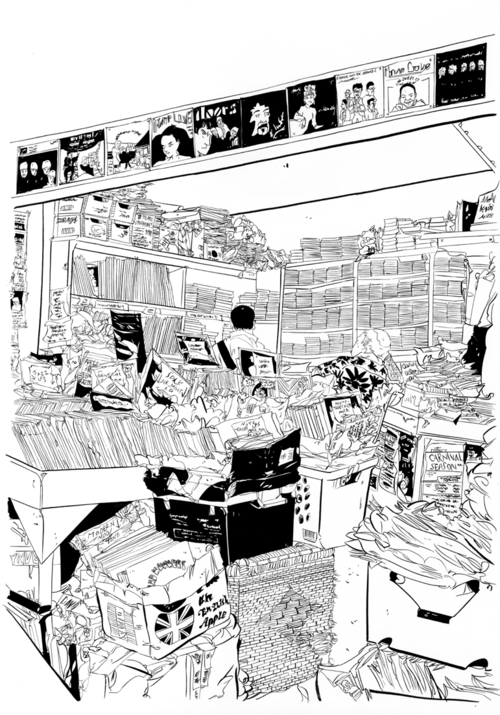
In your AYW contribution you cite Dropdead as one of those bands that, upon first listen, made you realize that “your world [had] just instantly changed.” What is some other music that’s done that for you, and how? Or, not limiting it to music, are there certain artists of any kind whose work has had that effect as well?
This is such a tricky question for me to answer. If I’m not careful, I’d just find myself reeling off a list of my favorite bands and artists, and it’d be incredibly hard work to decide the significance between them. I don’t wanna get too “High Fidelity!” I wrote about Dropdead in particular, as I can remember hearing songs like “Superior” and “Idiot Icon” off their second LP for the first time and just knowing that I’d found something which just nailed it for me. When I started playing in bands, I often used them as a basis for comparison in how I approached writing my own fast punk songs, and still do, to some extent. Also, I reckon the idea of convincing me to rethink a few aspects of my lifestyle in a 30-second hardcore song is pretty rad.
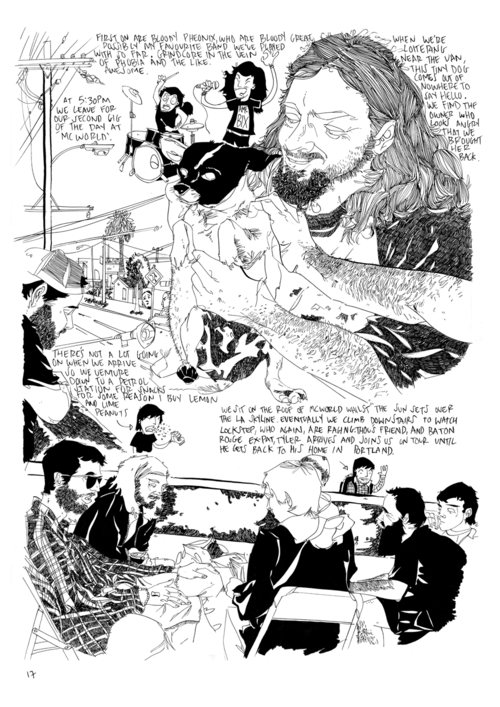
You also talk about your conversion to veganism, and the idea that art can be a tool to influence people and alter perspectives. What are some other examples of this, where art has made you or someone else think of things differently? Why do you think people are more open to accepting new or uncomfortable messages in art, as opposed to an opposing viewpoint in a newspaper or conversation with someone else?
When I started reading Calvin and Hobbes, I realized that Bill Watterson had this knack of succinctly expressing so much in about three or four panels. It amazes me that a tiger and a naughty kid can discuss philosophy, political science, ethics, economics, and beyond, [and] then present them in a really precise, human way that allows you to relate on such a base emotional level. The strip where Calvin finds an injured raccoon makes me tear up (not even joking, my bottom lip quivered a bit when I looked that up again for this answer), and the final comic, despite bringing things to a halt, is just incredibly powerful to me in how hopeful it is.
Also, Calvin and Hobbes is bloody hilarious! I think humor is a common language that art can use to deliver whatever content or perspective it’s pushing. I can only speak for myself, but I’d definitely say that reading Calvin and Hobbes has taught me to try and avoid cynicism when there’s so much to be in awe of, sometimes.

You currently live in Nottingham. When and why did you decide to move there? For those of us who have never been there, what is it like?
I moved to Nottingham at the end of 2007. I was just ready for a change, and as a visitor to the city and the punk gigs there, I always liked it. I had some friends from the music scene who lived there already, so it definitely was easier to settle in with their help. I soon felt welcome and wasted no time in getting involved with bands and gigs. It’s not a big city at all; you can usually get by on foot, and its geographical location in the midlands means you’re never too far away from other major cities. It’s fairly easy to get to, say, Leeds or London on public transport, plus there’s the Derbyshire Peak District nearby if you fancy something a little more remote.
Nottingham is always evolving, and across the years, I’ve always seen it as a hub for bustling creative, music, and activist scenes. There [are] loads of spaces and businesses that have a strong community-based DIY spirit that’s rooted in helping each other out. From studios/venues like Stuck on a Name, JT Soar, and The Sumac Centre, to businesses like The Music Exchange record shop, LeftLion Magazine, and Annie’s Burger Shack (to name a few), there’s just a great sense of support and camaraderie. I proper love living here now!
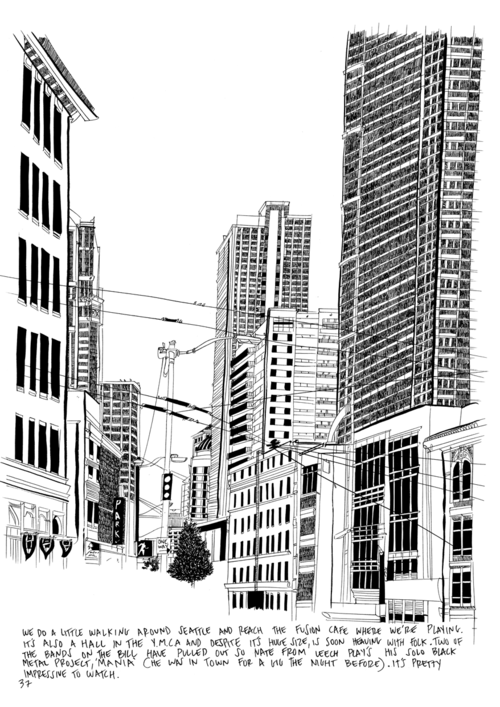
Do you make art exclusively, or do you also have to work? If so, what do you do? What’s your dream job?
I try to make art my living, but as I’m sure a lot of people will attest to, it’s hard. I usually need a day job, which isn’t ideal, but totally necessary if I want to pay my bills and rent. My dream job would be to eventually support myself with my art, but I’m a long way off. I don’t think I have delusions of what to expect by calling illustration or making comics my “career,” so long as I can get by OK with it. Whenever I have a “Why do I bother?” moment, I usually revert back to the fact that I’ve been making art for most of my life anyway, so I’d might as well carry on.
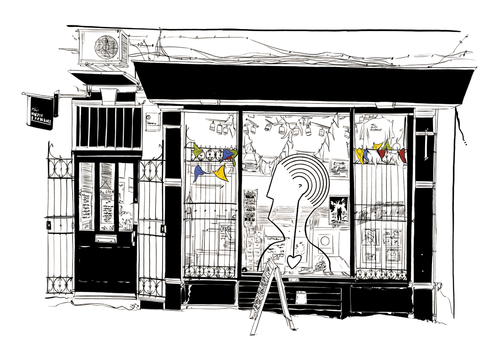
What are some of your favorite zines to read? Is there a particular genre you’re into?
A lot of my favorite zines are by my friends! Off the top of my head I love reading Brainscan, Gadgie, Truckface, Cometbus, Invincible Summer, So Midwest, I Was a Teenage Mormon, Facial Disobedience, and loads more that I’m forgetting. I don’t have a particular genre I favor over another, but I guess I read a lot of perzines, so I’m more likely to look in that direction than any.
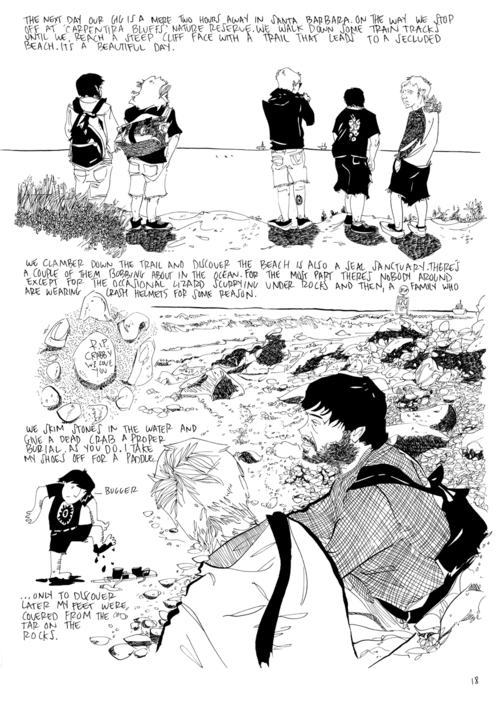
How do you define success?
I suppose in the sappiest way possible: trying to make the best out of what you have, keeping a solid, life-affirming group of people around you, and ultimately just to be happy.
Ready to devour the rest of Larder’s body of artwork? Head on over to his Tumblr, and fill in the missing pieces of your As You Were collection here.
